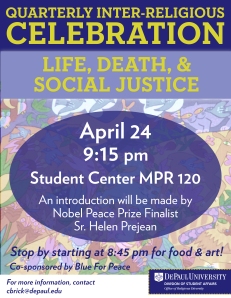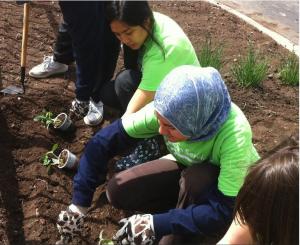
As the tragedy of the Boston Marathon bombings circulated around the news outlets, the DePaul University community stood shocked and worried. All of the faculty, staff, and students called their loved ones, and checked up on each other’s family and friends. Coincidentally, the Interfaith Scholars had been planning for their Spring Quarterly Interreligious Celebration with the theme revolving around, Life, Death, and Social Justice. The evening usually holds four significant segments. The first, is an opening prayer, which was held by DePaul Community Service Association, University Minister Rubén Álvarez, who asked the audience to center their minds, bodies, and spirits in order to be present. The second, is the opening introduction of the theme usually done by a short talk. The DePaul community was honored to have Sr. Helen Prejean talk about her interfaith experiences and the ways in which they effected the way she perceives life, death, and social justice. The third segment of the evening was composed of short-story performances and prayers by three DePaul students, Dana Jabri (Muslim), Tom Miller (Agnostic), and Josh Sushan (Jew), each of whom reflected on occurrences of life and death in their lives. Below is Tom Miller’s reflection and story he shared with the audience.
“I want to share a story which I think touches each of these themes: Life, Death and Social Justice. And then try to explain how I addressed them as someone who identifies as an Agnostic. For the past two summers I have been volunteering at a summer camp called Camp Courage. This camp is only a week long. This is a grief camp for people who are connected to a recent death. There are about 40 or so kids who go there each year, all between the ages of 6 and 13. Each and every one of these kids lost someone close to them, parents, friends, aunts, uncles, even siblings.
I remember very clearly the story of Alex. Alex was about 9 years old when I was introduced to him. I soon learned he had a twin brother. Alex liked to swim and was on a swim team. One day their mom drove them to a swim meet. But as they were on their way to the swim meet, a garbage truck sped through a red light and crashed into the car Alex’s mom was driving. Alex’s twin brother was instantly killed and the crash only mildly wounded Alex and his mother.
When I was talking to Alex he would ask questions like, “Why did I have to live and he die?” He felt guilty for living, he felt like he was wrong to be alive, to be given life when his brother had his life stripped away because they were going to Alex’s swim meet.
So as an Agnostic how was I supposed to approach this situation? Was I supposed to talk about the meaning of life? About Karma, an afterlife, Heaven, Hell, God? I didn’t know what faith his parents were raising him with. Should I talk about morality, or all the philosophical ideas I have been learning about for the past few years? Where was Social Justice? What would Social Justice say I should do? What about that garbage truck driver? Should he be thrown in jail for the rest of his life? What if it was an accident?
What was I supposed to tell to a 9 year old about life and death? Especially when I had no idea what I thought of it, or am still trying to figure out what to think of it. I did not want to tell this little boy that he will see his brother in heaven. I didn’t know that, I wasn’t sure of that. I’m still not sure of that. I didn’t want to lie. I wanted to tell him something, to comfort him, to give him something to believe in, something to give his life meaning. But should I be the one to give meaning to someone else’s life? I didn’t want to sugar coat anything, but I also knew that I couldn’t give him a long philosophical lecture based on everything I had been learning at DePaul.
What I ended up doing was listening to his story. I looked him in the eye and I smiled. I shared with him a moment of my life simply listening. The only thing I knew at that point in time was that I cared for this boy. While I have never lived his life or went through what he went through I understood that there was an intense struggle he was going through. At that moment I knew that he was not alone, and that I was also not alone. As an Agnostic I realized that I don’t know how to answer these questions, but I think we should be okay with talking about them.
Now, when I go to camp courage this upcoming summer, I’m going with the goal of trying to make kids smile. I think sometimes we forget how to smile or how to have fun and we all need to be reminded every now and then.
One of my favorite intellectuals to quote is Einstein. With all his knowledge and wisdom, he wrote this, ‘The life of the individual has meaning only insofar as it aids in making the life of every living thing nobler and more beautiful…'”
– Thomas Miller
Knowing that the Anti-Death Row activist and spiritual guider Sister Helen Prejean was going to present the opening remarks introducing the theme of the evening, as a group, the Scholars began to think of ways in which we could get the campus students’s ideas, thoughts, and topics they wanted to discuss after the introduction was given, as the interreligious dialogue activity for the evening. The idea was to get the students to form discussions that came from their own quandaries. So we collected questions, topics, and ideas from the 200+ students that were present. For the last segment of the evening, we invited the students and audience to participate in meaningful discussions about the ways in which life, death, and social justice effect the ways in which we percieve our faith traditions, and as students of the DePaul community.
Some of the questions suggested:
What about your religious tradition do you find life-giving?
Do you feel the responsibility to engage in social justice work? How does your personal faith tradition or belief system inform your answer?
What do you hope to do in your life before you die?
Sr. Helen Prejean talked about the tragedy of the Boston Marathon, how do we as a DePaul community provide support to the Boston community?
As the event came to an end, the faculty, staff, and students had for the last time this school year, reflected as a community on their individual faith values to the roles that life, death, and social justice play within one’s life.
– Dana Jabri ’15





